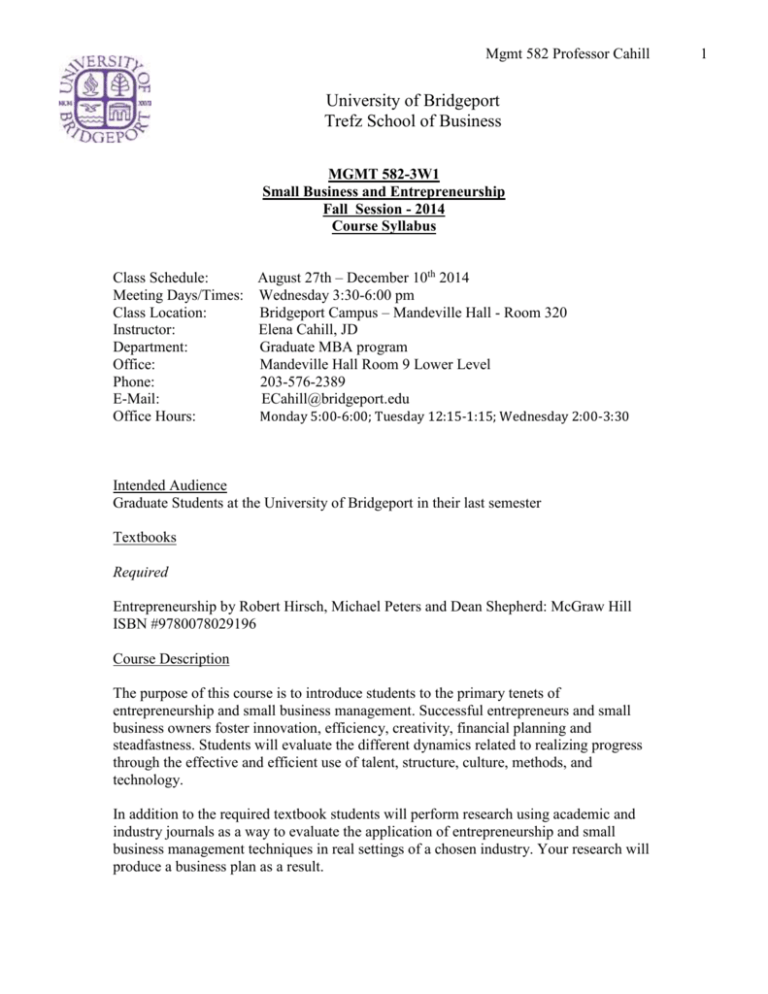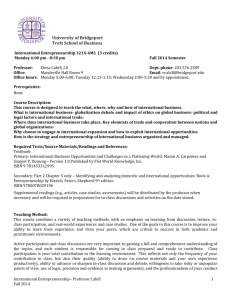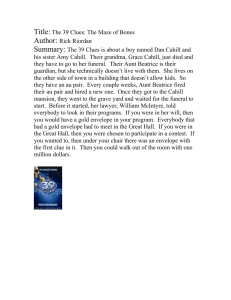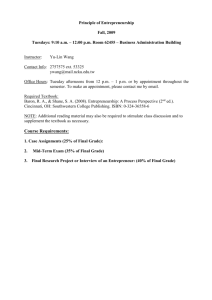Learning Objectives - University of Bridgeport
advertisement

Mgmt 582 Professor Cahill University of Bridgeport Trefz School of Business MGMT 582-3W1 Small Business and Entrepreneurship Fall Session - 2014 Course Syllabus Class Schedule: August 27th – December 10th 2014 Meeting Days/Times: Wednesday 3:30-6:00 pm Class Location: Bridgeport Campus – Mandeville Hall - Room 320 Instructor: Elena Cahill, JD Department: Graduate MBA program Office: Mandeville Hall Room 9 Lower Level Phone: 203-576-2389 E-Mail: ECahill@bridgeport.edu Office Hours: Monday 5:00-6:00; Tuesday 12:15-1:15; Wednesday 2:00-3:30 Intended Audience Graduate Students at the University of Bridgeport in their last semester Textbooks Required Entrepreneurship by Robert Hirsch, Michael Peters and Dean Shepherd: McGraw Hill ISBN #9780078029196 Course Description The purpose of this course is to introduce students to the primary tenets of entrepreneurship and small business management. Successful entrepreneurs and small business owners foster innovation, efficiency, creativity, financial planning and steadfastness. Students will evaluate the different dynamics related to realizing progress through the effective and efficient use of talent, structure, culture, methods, and technology. In addition to the required textbook students will perform research using academic and industry journals as a way to evaluate the application of entrepreneurship and small business management techniques in real settings of a chosen industry. Your research will produce a business plan as a result. 1 Mgmt 582 Professor Cahill This will be a fast paced course with a heavy reading load the first half of the semester. The reading for the class must be completed prior to the class date. Learning Objectives gain an appreciation for the timeless dimensions of entrepreneurship understand a business plan, its intent and purpose know the similarities and differences between leadership and management empathize with the challenges facing modern-day entrepreneurs appreciate the dynamics of sustaining effective small business management grasp the methods for choosing the appropriate organization structure describe the management functions of planning, organizing, staffing, directing and controlling reconcile the gap between theory and practice in these topics Teaching Method: This course combines a variety of teaching methods, with an emphasis on learning from discussion, lecture, in-class participation, and real-world experiences and case studies. One of the goals in this course is to improve your ability to learn from experience and from your peers, which are critical to success in both academic and practitioner environments. Active participation and class discussion are very important to gaining a full and comprehensive understanding of the topics, and each student is responsible for coming to class prepared and ready to contribute. Class participation is your total contribution to the learning environment. This reflects not only the frequency of your contribution in class, but also their quality (ability to draw on course materials and your own experience productively), ability to advance or sharpen in-class discussion and debate, willingness to take risky or unpopular points of view, use of logic, precision and evidence in making arguments), and the professionalism of your conduct (attendance, punctuality, preparedness, and showing respect to all class members and class contributions). Class attendance and participation are required and factor into the course grade. Assessment of Learning: In-class and Collaborative Business Plan Work We will work collaboratively on a variety of in-class activities, including business plan writing, discussion of news and current events, problem solving and analytical exercises, and relevant assessments pertaining to the topic of focus. I will provide students with instructions, documents and resources that require advance preparation, and any other materials that can be examined in a timely manner during class (i.e., less than 15 minutes) will be distributed during class time for “hands-on” practical work. Individual contributions each week will be factored into the course participation grade, and this work cannot be made up. Midterm and Final Exams The midterm and final exams may consist of multiple choice, true/false, and short answer questions. The final exam will be cumulative. 2 Mgmt 582 Professor Cahill Course Evaluation and Grading: Class Participation and Business Plan Section Review 25% Business Plan 25% Mid Term 25% Final 25% 100% University of Bridgeport Grading Scale: Numeric Grade Letter Grade Evaluation Scale Value 93 A Excellent. Work of exceptional quality 90-92 A87-89 B+ 83-86 B Above-average achievement. 80-82 B77-79 C+ 73-76 C Minimal achievement. 70-72 CBelow average. 67-69 D+ 63-66 D 60-62 DLess than 60 F Quality Points 4.00 3.67 3.33 3.00 2.67 2.33 2.00 1.67 1.33 1.00 .67 University of Bridgeport Academic Policies: As a UB policy, it is expected that each student that attends one hour of classroom instruction will require a minimum of two hours of out of class student work each week for approximately fifteen weeks for one semester. Special Accommodations: All efforts will be made to accommodate students with physical disabilities or special needs. Academic Honesty Standards: It is the students’ responsibility to familiarize himself or herself with and adhere to the standards set forth in the policies on cheating and plagiarism as defined in the UB Student Handbook. A high standard of ethical conduct is expected of students in their academic activities. The University does not tolerate cheating in any form. This term is used to include dishonest use of another individual's aid in preparation of written assignments as well as during a classroom-testing period. The standard procedures for the preparation of term papers and the like, as established by the English Department, form the basis for decisions in cases of plagiarism (See Definition of Plagiarism). The student must be familiar with those regulations. Disciplinary 3 Mgmt 582 Professor Cahill action will be imposed, not only in cases of detected cheating, but also for violations of such regulations mentioned above. In the latter, a violation of the regulation without consideration of the motive involved will be deemed sufficient cause of action. Instructors have the right to determine the appropriate penalty for academic dishonesty in their own classes; generally, however, such acts will result in a failing grade for the assignment and/or the course as a whole. The penalty for subsequent acts of academic dishonesty may include expulsion. Definition of Plagiarism: INTENTIONAL AS WELL AS UNINTENTIONAL FAILURE TO ACKNOWLEDGE SOURCES AS WELL AS THE USE OF COMMERCIALLY AVAILABLE SO-CALLED "RESEARCH PAPERS" WITHOUT FULL RECOGNITION OF THE SOURCE. Students are responsible for distinguishing clearly between their own facts, ideas and conclusions and those of other sources. To use someone else's words, opinions, or conclusions without giving them credit is plagiarism. Students must be able to distinguish their own ideas, conclusions, discoveries, etc., from those read or heard. My Rules: Late class arrivals and absences: Attendance will be taken at the beginning of each class and students who arrive late will have their lateness documented. Three late arrivals will convert into one class absence. Three class absences will result in a 10point deduction of your course participation grade. Advise me in advance of anticipated conflicts. If you know you will be missing a class in which an assignment is due, advise me by e-mail and submit the assignment to me or bring it to the School of Business office prior to class to receive credit. Inappropriate behavior: I will ask you to leave the class if you are disruptive, including but not limited to texting, surfing the Web, demonstrating a disrespectful attitude, or excessive talking. I encourage an environment of mutual respect and courtesy. Late assignment submissions: Late assignments, projects and papers will have 10 points deducted per day. No work will be accepted after one week beyond the due date, and a grade of zero will be recorded. Extenuating circumstances may be considered, and must be discussed with the professor as soon as possible. Invest in a stapler. Any written work that is not stapled will not be accepted. No folded corners, no paper clips, and no loose pages will be accepted. Hard copy research paper submissions must be provided to the professor in addition to electronic research paper submissions. This course requires both an oral and written presentation of a business plan. Research is an important component of this class and it allows you the opportunity to integrate your interests with the course theories. You will be required to complete and present a full business plan. 4 Mgmt 582 Professor Cahill The assignment which will be written, should be typed and meet the minimum requirement for content and length. All assignments should be printed, stapled, paginated, and include a title, the student’s name and student number, the course name and section, and the type of assignment. All papers should use 12-point font, be double-spaced, and utilize a formal writing style. Writing is very important in any business environment and can make the difference in your ability to succeed in your career. These skills are also transferable to any discipline and vocation you choose to explore. Responding quickly and succinctly to assertions will also help you develop necessary skills in today’s time-sensitive culture. The Presentation should include a final slide with references and be printed in gray scale that contains six slides per page. Each slide should have a heading. Try to stay consistent (a.k.a. parallelism) within each slide. In other words, if your first statement is a proper sentence, then keep using sentences for the remainder of the slide and use proper punctuation. If you use bullets and start with verbs, then continue to use bullets and verbs for the remainder of the slide. Most students enjoy hearing what other students have researched, which is one of the reasons I will often ask you to share your research with the class. Although public speaking still ranks as one of the most feared things in this world (along with death) it is a necessary skill in most vocations, and honing your skills in an academic setting is far better than waiting for your speaking debut when your job is on the line. When presenting, please do not read the slides verbatim. Try to paraphrase your points and give the audience some insight into the important points in each slide. Please try to end your presentation by restating the primary problem and then stating your position, which may include your conclusion, a recommendation, or request for approval/funding etc. 5 Mgmt 582 Professor Cahill 6 Course Schedule: Note: I reserve the right to modify the course schedule at any time, and will announce any changes to the class appropriately. ALL MATERIALS MUST BE READ BEFORE THE CLASS IT IS SCHEDULED FOR EXCEPT CLASS 1 Classes 8/27 9/3 9/10 9/17 9/24 10/1 Topic Part 1-The Entrepreneurial Perspective: Entrepreneurship and the entrepreneurship mind set, Corporate entrepreneurship, Generating and Exploiting New Ideas Part 2- From Idea to Opportunity Creativity and Business Ideas, Identify and Analyze Domestic and International Opportunities, Protecting the Idea and Other Legal Issues Part 3 -The Business Plan, Starting the Venture, The Marketing Plan, The Organizational Plan, The Financial Plan Part 4- Funding the Venture Sources of Capital, Informal Risk Capital, Venture Capital, and Going Public Part 5 – Launching Growing and Ending the Venture Strategies for Growth, Accessing Resources, Succession Planning and Harvesting and Ending the Venture Cases 1-8 10/8 Midterm Review and Discuss and choose business plan topic, organize groups, and discuss preparation 10/15 MIDTERM 10/22 Prepare the Business and Industry Profile, Goals and Objectives 10/29 Prepare the Business Strategy and Description of Products and Services 11/5 Prepare the Marketing: Strategy, Claims, and Customer Interest 11/12 Readings & Assignments Due Chapter 1, 2, 3 Pages 1-82 Chapter 4, 5, 6 Pages 84-176 Chapter 6, 7, 8, 9, 10 Pages 178-288 Chapter 11,12 Pages 289-354 Chapter 13, 14, 15 Pages 355-440 Pages 443-487 Chapters Prepare the Plan of Operation 11/19 Prepare the Financials: Balance Sheet, Financial Statement, Projections for 2 years, Cash Flow and Prepare the End- Exit Strategy 12/3 Business Plan Presentations 12/10 FINAL - Mgmt 582 Professor Cahill 7









